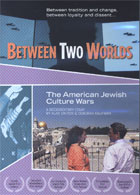
Between Two Worlds: A Documentary by Alan Snitow and Deborah Kaufman 2011
Distributed by Bullfrog Films, PO Box 149, Oley, PA 19547; 800-543-FROG (3764)
Produced by Alan Snitow and Deborah Kaufman
Directed by Alan Snitow and Deborah Kaufman
DVD, color, 70 min.
College - General Adult
Jewish Studies
Date Entered: 01/10/2012
ALA Notable: ala.gif
Reviewed by Sheila Intner, Professor Emerita, Graduate School of Library & Information Science, Simmons College GSLIS at Mt. Holyoke, South Hadley, MA
Subtitled The American Jewish Culture Wars on the box containing the DVD, this program has much to recommend it even though it has significant flaws. On the positive side, it lays out a series of issues currently disturbing many American Jews with strong connections to Israel; it tries to balance its view of these thorny issues; and it employs a variety of strategies to tell its story. The principal flaw is that it is also something of a mini-memoir, using Snitow and Kaufman’s own experience to document its points. Generalizing from such a tiny population is counter-productive in research and neutralizes the value of a study’s conclusions. Here, too, Snitow and Kaufman mainly document their own ideas, making it impossible to generalize them to all American Jewish culture. The story unfolds without pinning down all the details—who is portrayed, when events occurred—confusing the chronology of what viewers are seeing and how one event or person relates to others.
Ms. Kaufman explains that she started the first Jewish Film Festival in America in San Francisco, and later meeting Mr. Snitow. At some point, they begin making films together. Is this their first collaboration? We aren’t told. Between Two Worlds was prompted by an intense and divisive protest of some in the Jewish community to the Festival’s showing of Rachel, a film about Rachel Corrie, an American defending Palestinian rights who was killed in Gaza by an Israeli bulldozer. Festival head Peter Stein is surprised that anyone thinks showing the film is anti-Semitic or anti-Israel and brings a speaker who espouses that view to the theater’s podium. The speaker is angrily booed and, though Stein upholds his right to speak, later calls the speech “willful provocation,” subtly siding against it. What should be no surprise to anyone is that Americans attending a film about an American woman being killed by Israelis bulldozing her might be angered by a speech defending the act.
Between Two Worlds goes on to explore the issue of whether good Jews must love Israel unconditionally or that they can remain good Jews even if they criticize Israel. The question is, indeed, a proper one, but this documentary gives an answer despite presenting itself as objective. Defenders of “unconditional love” are mean-spirited, threatening, and are portrayed behaving like odious bullies. Defenders of “okay to criticize” include appealing, calm, rational spiritual leaders. The filmmakers’ bias is clear.
Technically, the program is excellent, with fine camera work, pacing, editing, and use of varying techniques. It seamlessly interweaves live action, taped interviews, and archival film clips. Technical quality, however, does not outweigh the treatment of the subject. Arguments for the “other” side need better treatment for the film to be truly “fair.”
Recommended, with reservations.